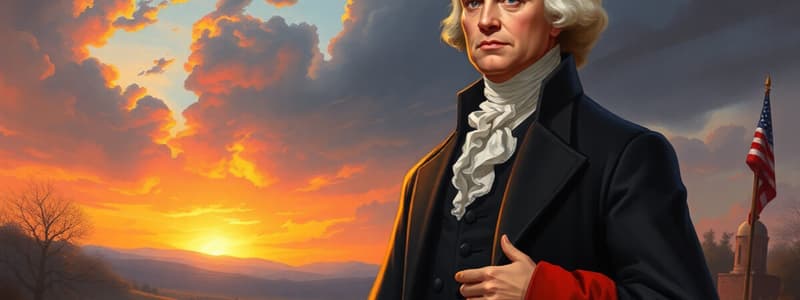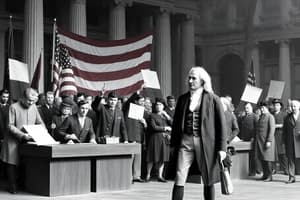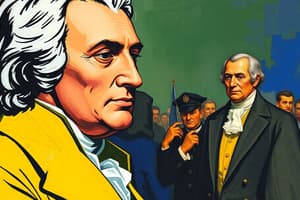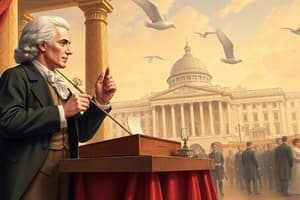Podcast
Questions and Answers
Who did Thomas Jefferson run against in the 1800 election?
Who did Thomas Jefferson run against in the 1800 election?
- Aaron Burr
- John Adams (correct)
- Alexander Hamilton
- George Washington
The election of 1800 resulted in a decisive victory for Thomas Jefferson.
The election of 1800 resulted in a decisive victory for Thomas Jefferson.
False (B)
What was Thomas Jefferson's campaign slogan during the 1800 election?
What was Thomas Jefferson's campaign slogan during the 1800 election?
Jefferson and Liberty
In 1800, Gabriel's Rebellion aimed to abolish ____.
In 1800, Gabriel's Rebellion aimed to abolish ____.
Match the following events related to Thomas Jefferson's presidency:
Match the following events related to Thomas Jefferson's presidency:
Which action did Jefferson take regarding military and taxes during his presidency?
Which action did Jefferson take regarding military and taxes during his presidency?
Jefferson believed in equality for all races during his presidency.
Jefferson believed in equality for all races during his presidency.
What was a significant consequence of Gabriel's Rebellion in Virginia?
What was a significant consequence of Gabriel's Rebellion in Virginia?
What significant power was granted to the Supreme Court by the ruling in Marbury v. Madison?
What significant power was granted to the Supreme Court by the ruling in Marbury v. Madison?
Jefferson's vision included promoting a manufacturing-driven economy.
Jefferson's vision included promoting a manufacturing-driven economy.
What was the strategic importance of the Louisiana Purchase for Jefferson?
What was the strategic importance of the Louisiana Purchase for Jefferson?
The Embargo Act of 1807 aimed to punish Britain for its impressment of American sailors and resulted in a ____ % reduction in exports.
The Embargo Act of 1807 aimed to punish Britain for its impressment of American sailors and resulted in a ____ % reduction in exports.
Match the following Supreme Court cases with their significance:
Match the following Supreme Court cases with their significance:
Which of the following represents Jefferson's contradiction between ideals and actions?
Which of the following represents Jefferson's contradiction between ideals and actions?
Jefferson's decision to implement the Embargo Act was a successful strategy for protecting American interests.
Jefferson's decision to implement the Embargo Act was a successful strategy for protecting American interests.
Who was the Chief Justice of the Supreme Court known for his significant influence during Jefferson's presidency?
Who was the Chief Justice of the Supreme Court known for his significant influence during Jefferson's presidency?
Jefferson was offered the entire ____ Territory by Napoleon.
Jefferson was offered the entire ____ Territory by Napoleon.
What year was the Embargo Act implemented?
What year was the Embargo Act implemented?
Flashcards
Jefferson's Presidency
Jefferson's Presidency
Thomas Jefferson's time as the 3rd President of the United States, marked by a shift towards a more democratic political approach and a focus on limited central government.
1800 Election
1800 Election
The Presidential election pitting Thomas Jefferson (Republican) against John Adams (Federalist), resulting in a tie and a decision by the House of Representatives.
Gabriel's Rebellion
Gabriel's Rebellion
An 1800 slave rebellion led by Gabriel in Richmond, Virginia, aiming to abolish slavery.
Jefferson's Reduced National Debt
Jefferson's Reduced National Debt
Signup and view all the flashcards
Barbary Pirates
Barbary Pirates
Signup and view all the flashcards
Limited Federal Influence
Limited Federal Influence
Signup and view all the flashcards
1800 Election Tie
1800 Election Tie
Signup and view all the flashcards
Political Hypocrisy (Jefferson)
Political Hypocrisy (Jefferson)
Signup and view all the flashcards
Judicial Review
Judicial Review
Signup and view all the flashcards
Louisiana Purchase
Louisiana Purchase
Signup and view all the flashcards
Embargo Act of 1807
Embargo Act of 1807
Signup and view all the flashcards
Agrarian Republic
Agrarian Republic
Signup and view all the flashcards
Marbury v. Madison
Marbury v. Madison
Signup and view all the flashcards
Limited Government
Limited Government
Signup and view all the flashcards
Strict Interpretation
Strict Interpretation
Signup and view all the flashcards
John Marshall
John Marshall
Signup and view all the flashcards
Lewis and Clark Expedition
Lewis and Clark Expedition
Signup and view all the flashcards
Study Notes
Thomas Jefferson's presidency
- Thomas Jefferson, a Republican, ran against John Adams, a Federalist, in the 1800 election.
- The 1800 election was the first time both parties nominated candidates and actively campaigned.
- The election resulted in a tie between Thomas Jefferson and Aaron Burr, forcing a decision in the House of Representatives.
- Alexander Hamilton intervened to ensure Jefferson's victory after 36 votes.
- Jefferson's victory reflected a shift towards a more democratic political approach, with greater freedom of expression for ordinary people.
- Federalists never posed a significant threat in presidential elections again.
- John Adams set a precedent by peacefully handing power over to his rival, Jefferson.
- Jefferson's campaign slogan was "Jefferson and Liberty," but freedom remained limited.
- Only a fraction of white men could vote, and slavery denied freedom to African Americans.
- Jefferson was a racist who believed in the inherent inferiority of Black people and Native Americans.
- Despite fathering children with a slave, Jefferson held onto his slaves and sold them for profit.
- Jefferson's hypocrisy regarding his beliefs on freedom and equality is a point of debate among historians.
- In 1800, Gabriel's Rebellion, led by a blacksmith from Richmond, Virginia, aimed to kill white residents, hold the remaining population hostage and abolish slavery.
- The rebellion was thwarted before it could be executed, resulting in the death penalty for Gabriel and 25 other individuals.
- Virginia tightened its slave laws following the rebellion, restricting slave gatherings and making it harder for slave owners to legally free their slaves.
- Jefferson prioritized a small central government with reduced taxes and a smaller military, aiming to establish a nation based on agriculture and self-reliance.
- Jefferson abolished all taxes, including the whiskey tax, while maintaining tariffs.
- Jefferson significantly reduced the national debt after assuming office.
- Jefferson's administration's minimal military led to difficulties in combating Barbary pirates who were kidnapping American sailors in the Mediterranean Sea.
- This situation demonstrates how foreign policy can disrupt domestic priorities.
- Jefferson aimed to minimize federal influence, but faced limitations from conservative and undemocratic institutions like the Supreme Court.
- Jefferson appointed Republicans to most government positions, but couldn't replace Supreme Court justices, who hold lifelong appointments.
- The Supreme Court, led by Chief Justice John Marshall, a Federalist, exercised significant power in shaping the nation's legal landscape.
- Marshall presided over the court for an extended period and is considered one of the most influential figures in its history.
- Marshall's most famous ruling, Marbury v. Madison (1803), granted the Supreme Court the power of judicial review, allowing it to determine the constitutionality of legislation.
- This power was extended to state laws in Fletcher v. Peck and ultimately to governmental actions.
- The power of judicial review, although now commonly perceived as a primary function of the Supreme Court, is not explicitly defined in the Constitution.
- Jefferson and his Republican colleagues favored a strict interpretation of the Constitution, aiming to restrict government power.
- Jefferson's belief in limited government was challenged when the opportunity arose to purchase a vast territory from Napoleon.
- Jefferson, aiming to secure New Orleans to facilitate westward commerce, was offered the entire Louisiana Territory by Napoleon, who was eager to sell due to the Haitian Revolution and financial difficulties .
- Jefferson doubled the size of the United States by purchasing the Louisiana Territory for 15million,equivalentto15 million, equivalent to 15million,equivalentto250 million today.
- Jefferson's decision to purchase the territory despite the lack of constitutional authorization for such action highlights the conflict between his principles and practical necessity.
- Jefferson dispatched Lewis and Clark to explore the newly acquired territory, leading to further expansion of presidential power and influence.
- Critics, including Federalists, argued that the acquisition of the territory was too costly and unnecessary.
- Jefferson believed in promoting an agricultural nation of self-sufficient farmers.
- His vision of an agrarian republic aimed to establish a nation of independent individuals, free from market pressures and reliant on their own land.
- To support his vision, Jefferson implemented the Embargo Act of 1807 to punish Britain for its impressment of American sailors and blockade against France.
- Jefferson sought to promote free trade but achieved the opposite.
- Jefferson's embargo backfired as Britain and France were too occupied with their conflicts to be significantly impacted.
- The Embargo Act had a devastating effect on the American economy, reducing exports by 80%.
- The lack of imported goods from Europe inadvertently fostered the development of American manufacturing.
- The Embargo Act proved to be a failed strategy for achieving Jefferson's vision of an independent agrarian nation.
- The Embargo Act highlights the contradiction between Jefferson's ideals and the reality of government action, demonstrating a significant use of government power to limit individual freedoms.
- This act ultimately led to America's first declared war, as discussed in future episodes.
- Jefferson's legacy involves both admiration and criticism.
- While the Declaration of Independence, of which he was a primary author, laid out fundamental principles, it also encapsulated the inherent flaws of the nascent nation.
- As President, Jefferson exhibited a similar duality, claiming to advocate for limited government while expanding its power and fostering a manufacturing-driven economy despite championing an agrarian society.
- He promoted freedom while owning slaves and encroaching on Native American lands.
- Jefferson 's personal and political life reflects the complex history of the United States, including both its ideals and its shortcomings.
Studying That Suits You
Use AI to generate personalized quizzes and flashcards to suit your learning preferences.




